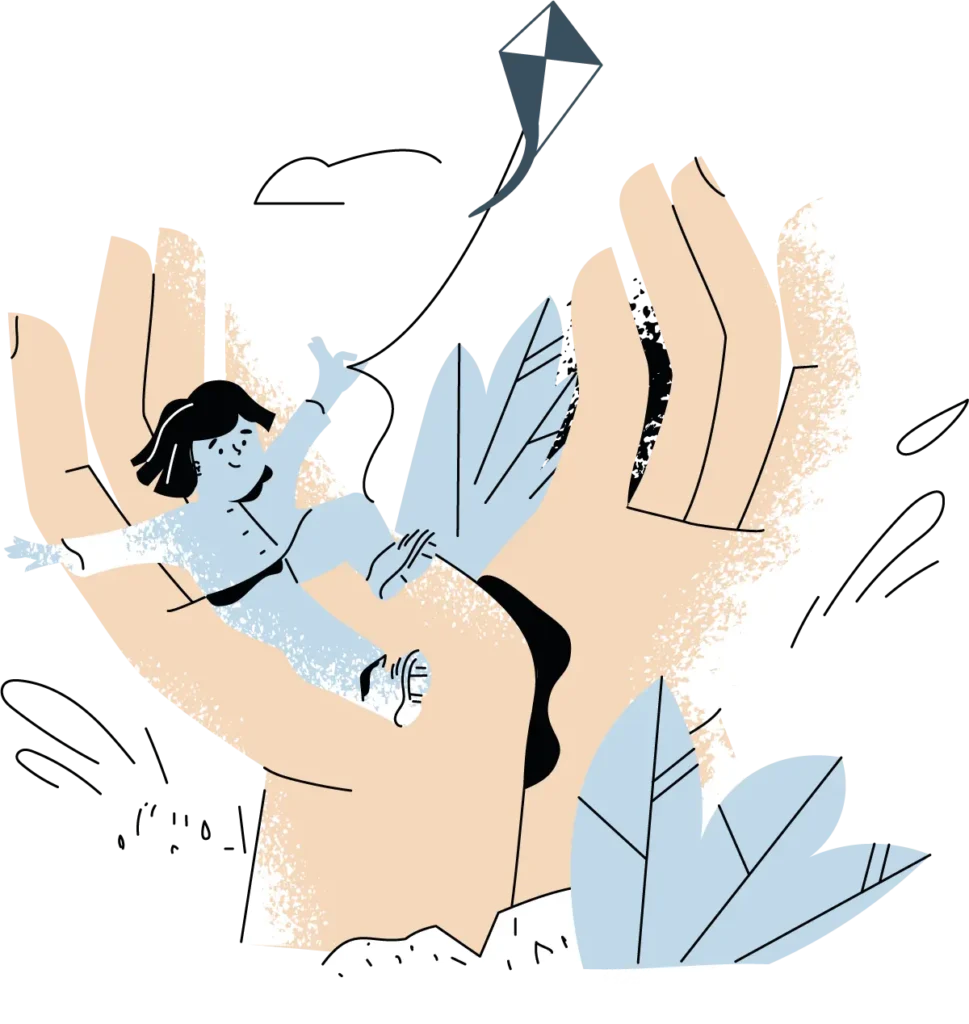What is Difficulty Remembering Faces in Childhood?
Memory for faces refers to remembering how familiar people look.
Some children have difficulty remembering people’s names or recalling how they look. In childhood, problems with facial recognition could relate to attention, memory, cognitive development, or social development.
Researchers have studied eye movements in babies, toddlers, children, and adults. A typical encoding pattern for a new face focuses on the eyes, nose, and mouth.
Some individuals do not encode faces this way, and they may look more at the chin, the forehead, or away from the face entirely. Some of this research on how a person encodes faces suggests that we can use this information to identify babies who may be at risk for developing an Autism Spectrum Disorder.
Eye movements are just one early marker being studied in siblings of those on the Spectrum to determine earlier ways to identify children who can benefit from early therapies and supports.
Trouble with remembering faces can also be related to what we pay attention to in our environment. Sometimes, faces or other visual stimuli do not grab a child’s attention or stick in their memory.
For some children, processing faces or emotions may not happen as easily as processing other kinds of information and details.
“Visual Memory is the ability to remember something by looking at it. Someone who struggles with visual remembering visual stimuli may have difficulty with games like memory, with recalling people from family photos, or with recognizing familiar people.”
Symptoms of Difficulty Remembering Faces in Children
- Struggles to recognize familiar faces: Your child becomes confused if someone they know gets a haircut or wears glasses one day
- Not recalling what someone looks like: Your child is saying, “I can’t recall that face. Have I met her before?”
- Not remembering: Your child is sitting at the same table with kids all year and not recognizing them. Other children may get frustrated at recess or lunch when your child forgets who they are
- Distracted when meeting new people: Your child may space out when meeting someone new. They may hide behind your leg or simply walk away when people are talking, become confused, and get lost in large groups of people
- Looking away: Your child looks away when someone says, “Hi. How are you?”
- Fails to remember people but can easily remember random facts: Your child can quickly recall facts such as Pi to the 30th place or every fact about the sea lion but does not know anyone in their class
Causes of Difficulty Remembering Faces in Childhood
- Deficit in social skills: Your child may not be as engaged socially, so they do not focus as much on other people’s names or faces. They might be on a soccer team for a whole season and not remember anyone on the team.
- Poor perspective-taking and empathy: You may notice your child has a hard time making friends and interacting socially with peers. Your child may get people confused, for example, thinking the school librarian is the principal or the recess monitor is the music teacher.
- Challenges with visual memory: Your child may struggle to remember something by looking at it. Someone who struggles with visual memory may have difficulty playing games like memory, recalling people or pictures, recognizing familiar people, or recalling landmarks.
- Attention challenges: Your child may have difficulty remembering faces because of an attention problem. Attention challenges may impact visual memory because your child may not be paying attention to their surroundings. Details and elements may slip by unnoticed.
- Episodic memory challenges: Your child may have trouble remembering recent events or ‘episodes’ of life. In this case, your child may have difficulties remembering faces because they don’t remember the details of the events. For example, they might not remember what Aunt Rita looks like because they don’t recall seeing her last summer at the family reunion.
- Cognitive processing: Your child could have a deficit in learning and memory. Due to poor cognitive processing abilities, children may struggle to remember what they see (visual encoding) or hear (auditory processing).
- Poor social cognition: Your child may not understand the thoughts, motives, and perspectives of others.
- Brain injury: Your child may have had a brain injury in the past. Sometimes a child who has been in a car accident or has hit their head playing sports will sustain a brain injury. A concussion is a brain injury and should be taken seriously. Damage to the prefrontal cortex impacts how we pay attention and process information; an injury to the temporal lobe can affect memory or facial recognition.
- Personality trait: Your child may not be as socially engaged. They may have a very introverted personality. We can teach engagement with others at a young age, but it is also okay for a child to be more introverted. They may prefer playing with one friend, reading books, or studying. Not all children engage easily in social settings, and in that case, it may be hard to remember peers’ names.
What to Do about Not Remembering Faces in Childhood
- Provide labeled pictures and visual reminders: Have pictures of family members and friends that are labeled, and look at these with your child when you have a moment. “Oh, look at Aunt Sally at the beach last summer, and there’s your cousin Tom. We’ll see them next month.”
- Class yearbook: Hang up a class photo from last year in your home. Write the names of each child on the picture. Review the children’s names.
- Develop a system: If your child struggles with facial recognition, develop a secret cue they can use so that you remind them in a subtle way of who the person is.
When to Seek Help
The biggest sign that it is time to seek help is when your child consistently struggles to make friends. You may notice your child is confused or frustrated frequently during social interactions.
You may see your child having one of the following challenges:
- if your child says they have lots of friends but cannot tell you much about them
- if your child knows their friends’ heights and eye color but cannot recall their names or recognize them in class
- if your child has worked with these kids in class for years but does not remember their names or faces
- if your child bosses other kids around or lectures on a topic without stopping to assess whether anyone is listening
- if your child never asks how others are doing or fails to carry on a back-and-forth conversation
If any of the above challenges are frequently happening, it would be good to seek help.
Further Resources on Difficulty Remembering Faces in Childhood
- Neurologist: to look at brain-based causes for visual memory deficits if these deficits seem to be severe across multiple settings. It would be important to rule out seizures, as they could look like a lapse in memory.
- School psychologist: to determine learning needs based on neuropsychological profile; perhaps an IEP, 504 plan, or RTI is warranted to help your child.
- Psychologist or neuropsychologist: to consider a full assessment and to consider a child’s symptoms in mental health and behavioral contexts
Other Similar Conditions to Difficulty Remembering Faces in Childhood
- Attention Deficit Hyperactivity Disorder (ADHD): challenges sustaining attention, distractibility, impulsivity, and at times slow processing speed that can all impact how we learn and engage with the environment
- Autism Spectrum Disorder: restricted interests or behaviors; hyper-focus; challenges with social communication. Research supports the idea that individuals with autism have more difficulty recalling people’s faces; this aspect is an important consideration if your child cannot remember friends’ names or faces
- Major Depression: depressed mood, or, in children, pervasive irritability; decreased interest in activities that used to be enjoyable; leads to apathy, checked-out behavior, and mood; depressed individuals may forget things easily
- Learning Disability (Educationally Identified Disabilities): learning problems, memory deficits, or poor cognitive efficiency may be the reason for challenges remembering faces
- Brain Injury: damage to regions in the brain can result in memory challenges around facial recognition
Book Resources on Difficulty Remembering Faces in Childhood
Kroncke, Willard, & Huckabee (2016). Assessment of autism spectrum disorder: Critical issues in clinical forensic and school settings. Springer, San Francisco.
Ozonoff, Sally & Dawson, Geraldine & McPartland, James C. (2014). A parent’s guide to high functioning autism spectrum disorder: How to meet the challenges and help your child thrive.
Barkley, Russell A. (2013). Taking charge of ADHD, 4th edition: The complete, authoritative guide for parents.
Lorayne, Harry & Lucas, Jerry (2012) The Memory Book: A classic guide to improving your memory at work school and play.
Grandin, Temple. (2006). Thinking in Pictures, Expanded edition: My life with autism.Higbee, Kenneth. (2008) Your Memory: How it works and how to improve it (A book about Mneumonics)


